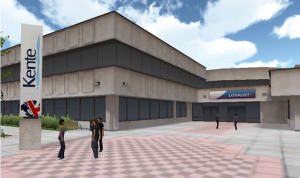Loyalist College Wins LERN Award for Programming
Learning by Doing!
By Megan Gartrell, Staff Writer
Virtual learning environments are a growing trend bound to filter their way into most universities in the near future. For now, there are only a few colleges in Canada that offer these types of programs and Loyalist College is proving to be an innovative leader in the field.
Located in Belleville, Ontario, Loyalist recently received the 2013 International Learning Resources Network (LERN) Award for Programming at the LERN 40th Annual Conference in Washington, D.C. Loyalist was one of six nominees for the international Programming award, and the only Canadian college nominated
“It’s always nice to win an award,” said Mark Kirkpatrick, director of Information Technology Services at Loyalist College, by telephone interview. “Recognition is good. This is a very unique thing that Loyalist is doing. There aren’t many people in North America that are [building virtual programs], so what we are doing is being watched by a lot of people.”
InfiniteSpaces Virtual Design Centre, a division within Loyalist College, designed the winning virtual cookie factory program. For the past five years, inifiniteSpaces has created a number of learning simulations for both private sector clients and governments across North America.
Students in the Process Operator—Food Manufacturing Apprenticeship program, create their own avatars and delve into a realistic factory floor to learn and respond to scenarios they might typically encounter on the job.
“It is a virtual world,” said Kirkpatrick “You go in to learn. It’s not a social world environment, so those distractions are eliminated. It’s learning by doing in places that are not necessarily available to students today. A factory floor is a good example because not many factories are going to turn students loose on a potentially dangerous floor to learn about electrical and instrumentations.
“Here we put them in a factory, dressed accordingly, so they feel like they are actually doing that job and learning the things they need to do. The fact that they can learn a lot of these things before they enter the real place is very advantageous. It’s critical in getting them ready for the real world.”
And this “real-life” experience can make all the difference in a student’s transition from classroom to career. Many recent graduates lose out on jobs because of a lack of “hands-on experience.” At Loyalist, students gain that experience while earning credits simultaneously. These types of virtual worlds are creating a well-needed bridge.
However, some may argue that a virtual learning environment could lead to learning filled with distractions and diversions. A virtual world, unlike a textbook, is packed with sound, colour, and dialogue. Kirkpatrick believes they have eliminated certain aspects that help with this potential drawback.
“One of the things that we do for all our educational applications of this is minimize some of the disruptions you would see with a virtual world,” said Kirkpatrick. “You create your own avatar, but we minimize the amount of changes you can make.” [pullquote]One of the things that we do for all our educational applications of this is minimize some of the disruptions you would see with a virtual world[/pullquote]
Another criticism is the likelihood a mature learner might be intimidated by the format and the technological aspect of these programs. When asked if he felt that a younger generation was drawn to the classes more so than mature students, Kirkpatrick said, “We don’t find age to be an impairment at all. We have a number of these environments we’ve done not just for institutions, but also for others across North America, and age has not really been a hindrance.
“The use of these environments are commonplace these days for a multitude of people. Yes, youth tend to use them more often because they tend to be gamers, but I know a lot of forty year olds that spend a lot of time gaming, male and female.”
Besides the fact that this type of learning is award-winning and beneficial, it also carries with it a cool factor. Gone are the hours spent behind a desk listening to a professor. Gone are the dusty projector slides and chalkboards. It’s a new and exciting world and each student gets to play a role. Students are learning safety procedures not from a safety training video but by immersing themselves in a realistic 3D world.[pullquote]Gone are the dusty projector slides and chalkboards. It’s a new and exciting world and each student gets to play a role.[/pullquote]
“The comment we get from students when they do these simulations is, ‘I felt like I was there,’” said Kirkpatrick. “And that’s the key; you hear the word ‘I’ a lot. ‘I did this, I accomplished this, I was able to solve the problem, I made the factory work again,’ and that is a very powerful statement to Loyalist.”
While technology continues to evolve, types of classroom learning will inevitably evolve as well. Perhaps one day there will be virtual surgeries performed in medical school or a virtual environment where Shakespeare comes alive. If Loyalist College is an example, this type of virtual learning environment will produce a generation of confident and capable students.
































Share the post "Loyalist College Wins LERN Award for Programming"